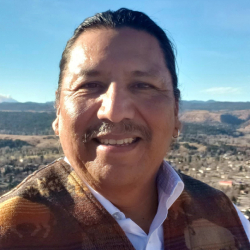2022 Candidate James Rattling Leaf
 James Rattling Leaf
James Rattling Leaf
Research Associate
University of Colorado-Boulder
Candidate for: Member of the Governing Board
I am a citizen of the Rosebud Sioux Tribe. My work is centered at the Wolakota Lab, LLC, which works to serve and support Indigenous peoples’ nation rebuilding efforts through the effective and respective application of Traditional Ecological Knowledge and Western science. I have over 25 years’ working with the U.S. federal government, higher education institutions and non-profits to develop and maintain effective working relationships with federally and non-federally recognized American Indian tribes, tribal colleges and universities and tribal communities. I specialize in supporting Indigenous engagement strategies, teaching Cultural Intelligence (CQ) methods and developing programs that utilize the interface between Indigenous people’s traditional knowledge and Western science. I see a greater vision of human knowledge that incorporates the many insights of human cultures and provides a context for our better understanding of the planet and the world.
I am a founding member of the Group on Earth Observations (GEO) Indigenous Alliance that was established at GEO Week 2019 in Canberra, Australia, to foster a continued, effective, respectful, and reciprocal relationship with GEO and representatives of indigenous communities from around the world. Currently, I serve in leadership roles with the University of Colorado-Boulder; North Central Climate Adaptation Science Center; Rosebud Sioux Tribe; GEO Indigenous Alliance; and the Ecological Society of America Traditional Ecological Knowledge Section. I was born on the Pine Ridge Indian Reservation USA and I have a degree in Lakota Studies from Sinte Gleska University.
What interests, experience or skills would you bring to this position?
Here are the following current and past appointments that have prepared to me advance on my leadership pathway:
- Chair, Ecological Society/America (ESA) Traditional Ecological Knowledge (TEK) section
- Committee member, Future of NSF Experimental Program to Stimulate Competitive Research Program
- Committee member, AMS Committee on Spirituality, Multifaith Outreach, and Science (COSMOS)
- Founding member, Group on Earth Observations (GEO) Indigenous Alliance
- Professional Research Associate, University of Colorado, Boulder, CO
- Vice-Chair, Rosebud Sioux Tribe Climate Crises Working Group
- Co-Principal Investigator, North Central Climate Adaptation Science Center, Boulder, CO
- Coordinator of Climate Partnerships, Great Plains Tribal Water Alliance, Pine Ridge, SD
- Principal, Wolakota Lab, LLC, Black Hawk, SD
- Visiting Collaborator, South Dakota School of Mines and Technology, Rapid City, SD
- Director, Geo-Spatial Applications Center, Sinte Gleska University, Mission
How would you support ESA’s mission? How would you plan to promote DEIJ in ESA membership and activities if elected?
The Biden-Harris Administration issued an historic Memorandum of Understanding in 2022 on Traditional Ecological Knowledge which is the first time TEK has been elevated by the White House in a broad and comprehensive way.
It is important to understand that this new MOU formally recognizes TEK as one of the many important bodies of knowledge that contributes to the scientific, technical, social, and economic advancements of the United States and our collective understanding of the natural world.
I think it is important for our ESA community to begin the process to explore and understand this body of knowledge and to learn how to work with it in respectful, reciprocal, relational and relevant ways.
It is essential that the value of TEK be honored and applied, and what is sacred to Indigenous communities and knowledge holders be protected. In my position on the ESA Governing Board, it is my pledge to advance and advocate for TEK and continue to provide leadership in articulating and acting on key ESA activities that support Tribal Nations, Tribal Colleges and Universities and Tribal students. Uplifting our ESA and Tribal communities with an eye to future generations is what’s most important.